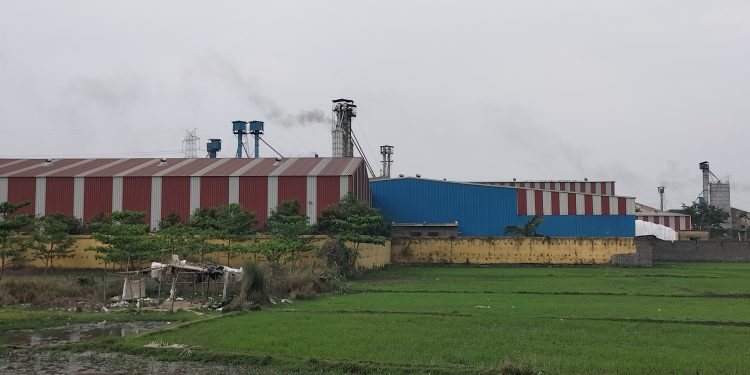Jajpur/Korei: Rice mills in the Jajpur district have turned out to be the bane of the local environment as they are discharging toxic water into open spaces, a report said. The discharge of toxic effluents is assuming alarming proportions by the day as the rice mills have not installed effluent treatment plants on their premises. The toxic water discharged overflows on the ground and pollutes the groundwater, atmosphere, and soil in their respective areas. The matter came to the fore after residents of Mulari mouza under Patharpada panchayat of Korei block lodged a complaint against Ashirbad Rice Mill in their area with the regional officer of State Pollution Control Board (SPCB) at Kalinganagar. They alleged that the rice mill is discharging toxic water after 10pm on a regular basis.
The toxic water flows down into nearby ponds and water bodies through a nullah. The pollution of the water bodies has affected the livestock and farmers in the area. Kailash Kabi, a villager, alleged that he had dug up a fishery pond on his farmland after taking a loan from a bank.
However, a whole lot of fish died after the toxic water discharged from the rice mill entered the pond. This has pushed him to the brink as he ponders over repayment of the loan after suffering loss. Kabi is not the lone person to have incurred losses, villagers Akshaya Samal, Madanmohan Jena, Golakh Dhal, Alok Behera, Prakash Mallick, and Satish Dhal have also lodged complaints against the rice mill with the SPCB. The toxic water is also destroying the fertility of the farmlands after it overflows on them. They demanded a permanent solution to the problem and warned to take to the streets if their demands are not met at the earliest.
Reports said that in 2009, the Orissa High Court, citing that the discharge of toxic water is violating Section 33(A) of the Air and Water (Prevention and Control of Pollution) Act-1981, had made it mandatory for rice mills to install effluent treatment plants on their premises. The HC had even directed to close down the rice mills that are not installing ETPs on their premises. After the court order, various rice mills in Jajpur district installed ETPs on their premises. The rice mills were also directed to renew and upgrade the ETPs subsequently.
However, some old rice mills in Panikoili and Barchana areas were alleged to have not renewed their ETPs. Irregularities were even alleged in the construction of ETP and the sanction of plans. It was alleged that some rice mills have installed substandard ETPs and are discharging toxic water in a separate channel outside the ETP. Sources said that the rice mills use 1 lakh litre of water daily to soak the paddy out of which 15 per cent of the water gets soaked but the remaining is discharged outside. This wastewater destroys the fertility of the soil when it overflows on land and also contributes to air and water pollution.
People are afflicted by various ailments after coming in contact with the water. The livestock is also affected. Aware of its ill effects, the SPCB has issued guidelines for the proper management of toxic water. However, the rice mills are blatantly violating these norms and discharging toxic water outside. When contacted, SPCB’s Kalinganagar regional officer said that action will be taken against erring rice mills after conducting a probe into the charges. Ashirbad Rice Mill manager Babula Das rejected the charges and termed the allegations as false.







































